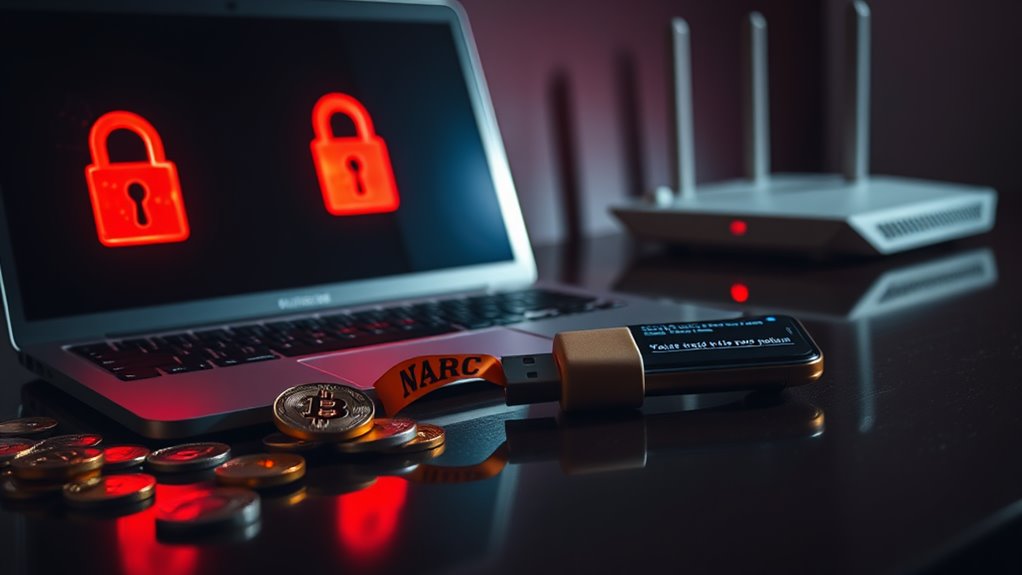Understanding the Crypto Trojan Threat
Note: This post may contain affiliate links, and we may earn a commission (with No additional cost for you) if you purchase via our link. See our disclosure for more info. The gold and crypto world is constantly changing. This is not financial, investment, legal, or professional advice. So, please verify the information on the gold and cryptocurrency provider’s websites.
Crypto trojans are the sneaky devils of the malware world. They lock your files tighter than a vault, and good luck getting them back without negotiating with the attackers. They spread like wildfire through shady emails and disguised apps. Victims are left panicked and confused, feeling like they've lost control. Unlike your run-of-the-mill malware, these nuisances thrive on chaos, making your life a digital hostage situation. Stick around, and see why this threat is so alarming.

When it comes to cyber threats, few things are as sneaky and frustrating as crypto trojans. These digital menaces operate under the radar, taking advantage of unsuspecting users with a cunning mix of stealth and brute force. Imagine waking up to find your files locked behind an impenetrable digital wall—how's that for a rude awakening?
Crypto trojans employ asymmetric encryption, using public/private key pairs to scramble your files. Nice, right? Except, without the attacker's key, you're left in the dark, completely unable to access your own data. Talk about a bad day!
Crypto trojans use asymmetric encryption to lock your files tight, leaving you helpless without the attacker's key. Good luck retrieving your data!
What's truly infuriating is the way these trojans infiltrate systems. They disguise themselves as harmless software, luring victims into a false sense of security. Click on that shiny new application? Bam! You've just invited a crypto trojan into your life. Most infections occur through emails with unknown attachments, making it crucial to be cautious. This method of infiltration highlights the importance of user education about recognizing phishing attempts.
Once inside, it's game over. The trojan pounces on files, encrypting them and leaving you stranded. No password, no chance. It's like locking your car and losing the keys in the parking lot. Good luck with that!
The encryption is the real kicker. Unlike regular malware that might just steal your data, crypto trojans make it impossible to retrieve your own files without the attacker's cooperation. And let's be real—good luck getting that. They thrive on chaos and confusion, reveling in the panic that follows.
It's a digital hostage situation, with your precious data dangling in the balance. Who knew cybercriminals could be so creative in their evil?
In a world where data is power, crypto trojans are the ultimate villain. They exploit human trust and technological weaknesses, reminding us that even the most innocent-looking software can harbor a dark side. Following the CCSS guidelines can significantly enhance your protection against these sophisticated threats that target cryptocurrency systems.
Frequently Asked Questions
How Does a Crypto Trojan Infect a Computer?
A crypto trojan can sneak into a computer through various sneaky tactics.
Think fake emails, sketchy downloads, or those “too good to be true” ads.
Once in, it can exploit software vulnerabilities or even hijack the clipboard to swap wallet addresses.
It's like a digital pickpocket, only way worse.
One minute you're browsing, the next, your crypto stash is gone.
Talk about a harsh wake-up call!
Can Antivirus Software Detect Crypto Trojans?
Antivirus software can spot crypto trojans, but not always.
Sure, it can catch the obvious ones like Trojan.BitCoinMiner with its scans.
But the sneaky ones? They play hide and seek.
Advanced trojans are like ninjas, dodging detection by monitoring security tools.
Real-time protection helps, but full scans are your best bet.
Wanna be safe? Don't skip those full scans.
Crypto trojans are crafty; they won't make it easy.
What Are Common Signs of a Crypto Trojan Infection?
Common signs of a crypto trojan infection? Oh, it's a wild ride.
Slow computer? Check. Random crashes? Double check. Your CPU working harder than you on a Monday? Yup!
Unexplained network spikes and suspicious uploads? Totally normal, right?
Then there's the fun of stolen credentials and missing files.
And let's not forget those pop-ups that make you question your life choices.
If it feels wrong, it probably is. Welcome to the chaos!
How Do Crypto Trojans Differ From Regular Malware?
Crypto Trojans and regular malware? Totally different beasts.
Crypto Trojans silently hijack your device's processing power for mining – think of it as a sneaky little parasite.
Regular malware? It's all about stealing your data or locking you out for ransom.
Crypto Trojans play the long game, lurking in the shadows.
Meanwhile, traditional malware prefers the dramatic, like crashing your system or demanding cash upfront.
What Should I Do if I Suspect a Crypto Trojan?
If someone suspects a crypto trojan, they should act fast.
Disconnect from the internet—like, right now. Run those antivirus scans and hope for the best.
Check the task manager for any questionable activity; it's like a digital detective game. Watch for strange CPU or GPU spikes.
And let's be real—avoid sketchy links like they're a virus. Change passwords and report it. Better safe than sorry, right?












